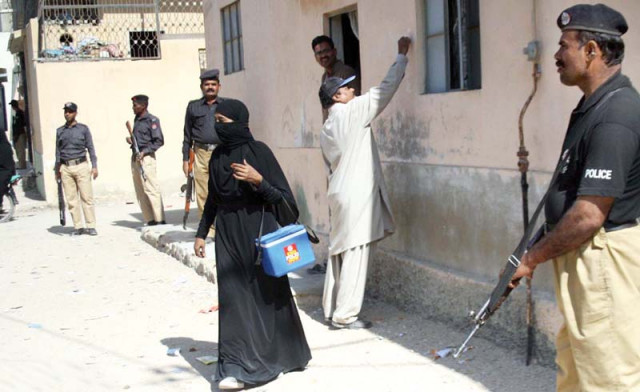LHWs to spread awareness about mental health
Dr Zafar Ejaz says mental illnesses are a neglected subject in healthcare system

A lady health worker carries her polio vaccines while on duty in Orangi Town. Policemen stand guard to avert any untoward incident. PHOTO: FILE
"There is confusion about mental illness among communities," said Karachi health services director Dr Zafar Ejaz. He added that the LWHs visit communities and therefore have been directed to take it as their responsibility to mobilise people.
Speaking at a seminar titled 'Mental Health Day' organised by Health and Nutrition Development Society (HANDS) in collaboration with the Basic Needs Pakistan (BNP) at Regent Plaza on Thursday, Dr Ejaz said that mental illnesses are a neglected subject in the healthcare system.
"It is a preventable disease and needs immediate attention and I, as a health manager, pledge to take it seriously now," he said. He added that all doctors and staff members working across the provincial capital will be given a briefing.
He said that the female workers cover Karachi's rural areas. "They work in the neglected areas of Karachi. They will be tasked to spread awareness among communities and refer suspected cases to hospitals."
The project
According to HANDS general manager Nadeem Wagan, HANDS and BNP had launched a two-year programme in two towns of the city, Bin Qasim and Gadap, covering rural areas. The project was aimed at promoting awareness about mental health, for which, several sessions were held. "It was a successful project and will be implemented in other parts of the country," he said. He added that his organisation targeted rural communities but such projects should be launched in urban areas as well.
Sharing details of the two-year project, project head Dr Anjum Fatima said that there are several families in rural areas who avoided getting their members treated. "The poor can't afford while rich avoid disclosing [such] diseases," she added. Dr Fatima said that around 10 mentally challenged persons, including a woman, have been treated. "They are [now] considered normal citizens by people living around them."
According to Murtaza Noonari, a senior official of the BNP, mental illness has never been considered a health issue. "Almost 16 per cent of the population suffers from mental illness." Noonari said that ideally there should be one psychiatrist for 10,000 people. But unfortunately in Pakistan, he said, there is not even one psychiatrist for 500,000 people.
Published in The Express Tribune, October 31st, 2015.



















COMMENTS
Comments are moderated and generally will be posted if they are on-topic and not abusive.
For more information, please see our Comments FAQ